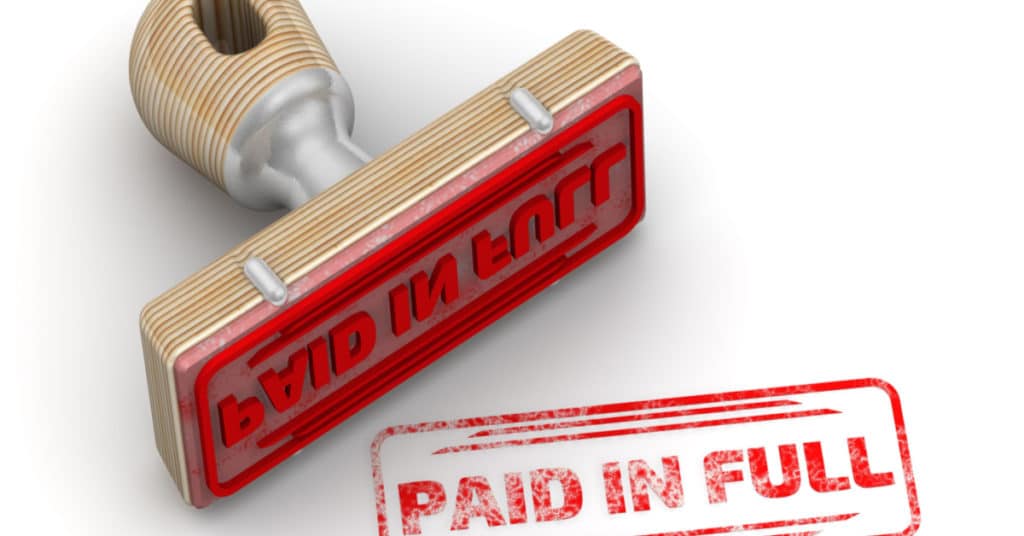According to newyorkfed.org, total household debt surpassed $17.5 trillion in the fourth quarter of 2023. Meanwhile, mortgages, auto loans and credit card balances increased by $174 billion. Chances are, you are one of those with ballooning debt searching for solutions.
Debt settlement is one of those options. However, many people worry about the risks and whether debt settlement is worth the extra costs.
Pro tip: There is no one-size-fits-all approach to debt repayment. Each person has a unique financial situation. You must research your options before deciding which method will work best for you.
Table of Contents
At a glance: The pros and cons of debt settlement
| Pros | Cons |
| Lower monthly payment | Creditors may not agree to settle |
| You’ll pay off debts faster | You’ll pay some interest and fees from missed payments in the early days |
| Long-term savings | You’ll have to be thick-skinned |
| Better option than bankruptcy | Many debt settlement programs will only accept debts totaling $10,000 or more |
| It could keep you out of court | Does not include secured debts |
| Fewer worries about money | Not all unsecured debts can be included |
| It will stop debt collection calls | |
| It will eventually be better for your credit score | |
| Better for your mental health |
READ MORE: Debt settlement — how to get your debt under control now
How debt settlement works
Debt settlement involves negotiating with creditors or debt collectors for a settlement amount that’s typically lower than what you currently owe. According to the American Association for Debt Resolution, debt settlement saves consumers $2.64 for every $1 in fees paid.
Pro tip: Most forms of unsecured debts, including medical bills, credit card debt, personal loans, payday loans and some private student loans, are eligible for settlement.
Borrowers with secured debts like mortgages and car loans have fewer options because they stand to lose an asset if they don’t repay the debt.
Debt settlement can be handled in three ways:
In any type of debt settlement effort, a borrower generally stops making payments on all enrolled debts. During this time, the borrower instead makes monthly deposits into a separate savings account until they have accrued enough cash to negotiate a settlement agreement with the creditor or debt collector. Once a deal has been reached, whether it’s a single lump-sum payment or a series of monthly payments, funds that have been collected in that separate account will be used to pay the settlement.
READ MORE: Debt settlement fees
Why it works: Most lenders would rather accept less than the total debt owed than risk receiving no payment at all.
READ MORE:How debt settlement works
Pros
A few key benefits exist for borrowers who successfully complete a debt settlement program.
- Long-term savings: You’ll end up paying less than you owe. Debt settlement companies negotiate on your behalf to persuade lenders to forgive part of the debt. Most creditors will agree to settle for a payment that falls between 30% to 50% of the loan’s original value.
- Fewer worries about money: One of the biggest advantages of debt settlement is escaping the debt cycle. By entering a debt settlement program, you are actively taking charge of your personal finances and working toward lowering your total amount of debt. When you’re finished, your financial situation will be improved and you’ll have a fresh start without feeling burdened by debt.
- Pay off debts faster: Because you ultimately end up paying a lower amount, you will solve your problems faster and feel less pressure when it’s time to pay the bills.
- It could keep you out of court: Payment plans can ward off a court summons, and you won’t be at risk of having your wages garnished.
- It could be the cheapest option: Debt settlement could cost less overall compared to credit counseling, debt management or making the minimum monthly payments. If you settle debt, it can be paid off in half of the time it would if you were to continue making minimum monthly payments. Some debt settlement companies can do it in as little as 12 months but, on average, it will take about 48 months.
- It may be a better option than bankruptcy: You can avoid a bankruptcy filing, which will hurt your credit for up to ten years. Debt settlement, or debt negotiation, involves wiping out debt by paying a portion of what you owe, either in a lump sum or fixed monthly payments. In doing so, you avoid going to the bankruptcy court. Filing bankruptcy should always be viewed as a last resort. Bankruptcy will do significant damage to your credit report and can cause difficulties getting home loans and even certain jobs in the future.
- Stop debt collectors from calling: If you settle with your creditors, this could stop harassing phone calls once your debt is paid. However, debt settlement is not designed to stop the collectors from calling.
- Positive impact on mental health: One of the negative impacts of having more debt than you can handle is dealing with your mental health. Once you have started to pay off your debts, this can give you a mental boost and inspire you to make better financial choices in the future.
READ MORE: 5 steps to pay off credit card debt over $10,000
Cons
Debt settlement also has a few disadvantages, but most of these are actually relatively minor.
- You’ll have to be thick-skinned: Creditors will continue to attempt to collect the outstanding debt and could get threatening. Because you will be asked to stop making payments, you will likely receive harassing calls and debt collectors may even try to contact your friends or family. However, debt collection is regulated by federal law, and you have rights through the Fair Debt Collection Practices Act, which is enforced by the Federal Trade Commission (FTC.)
- Creditors could refuse to settle: There are no guarantees that your creditors will agree to settle your debts. No matter what some debt settlement companies try to tell you, creditors are not legally obligated to negotiate settlements. But they usually will because, with a settlement, they’ll recover more funds than they’d get through other collection methods, including a collections agency or bankruptcy. One of the benefits of using a debt settlement company is that the company will know which creditors flat-out refuse to settle debts. If your creditor refuses to settle, you may have to opt for a debt management plan instead. With a debt management plan, you can negotiate for a lower interest rate but still pay the total amount owed.
- You may pay more in interest and fees: Mounting interest and late fees will accrue when you stop making minimum monthly payments. Since you will have to stop making payments, fees and penalties will continue to compound. If you do not complete your debt settlement plan, you could end up paying even more in the long run. Debt settlement programs can easily take two to four years to complete, so make sure you are dedicated to paying your settlement in full. If you don’t finish the program, you could end up owing more than you did initially.
- Does not include secured debts: A secured debt is a type of loan where the borrower uses an asset — like a house or car — as collateral to secure repayment. Because the debt is secured by this asset, the lender has no incentive to settle debts that you may be unable to repay. The lender can simply take possession of the collateral and sell it to recover the outstanding balance of the debt.
- Not all unsecured debts can be included: Certain unsecured debts are ineligible for debt settlement. This includes loans backed by the federal government, alimony, child support, auto repair bills and utility bills.
READ MORE: Debt settlement qualifications
Your credit score will initially fall but will rebound
Debt settlement will hurt your credit score in the short term, primarily because of late payments, charge-offs and a high debt utilization ratio. As you complete the debt settlement program, your credit score will start to rebound as you establish a pattern of on-time payments and close some of your accounts. It will be significantly less damaging to your credit score than a bankruptcy filing.
Debt settlement will impact your credit score differently based on your score before settlement. Borrowers with the highest credit scores will see the largest negative impact.
How it affects your credit score depends on a few other factors, including your credit utilization ratio, the number of open accounts you have and your debt-to-income ratio.
READ MORE: How will debt settlement impact your credit score?
Pro tip: Eventually, your credit will increase because settling debts improves your credit utilization ratio, one of the strongest influences on your credit score. The quicker you repay your debt, the sooner your credit scores will rise. Ultimately, it’s what you do after the program is complete that matters.
READ MORE: 15 ways to build credit without a credit card
Do you have to pay taxes on forgiven debt?
It’s complicated. Settling debt does have a few tax consequences. Forgiven debts over $600 may be counted as income on your taxes, so it’s possible that you’ll get 1099 forms from your creditors. The IRS could consider the forgiven debt as taxable income, and you may have to pay them for the total debt that has been settled.
If a lender forgives some or all of your debt, that forgiven amount may be considered taxable income. For example, if you owed $10,000 on a credit card and the lender agreed to accept $5,000 as a settlement, the forgiven $5,000 may be considered taxable income. However, there are some exceptions to this rule, particularly if the settlement was due to financial insolvency or hardship. Also, if you settle a debt for less than the total amount owed, you may be able to deduct the amount of interest that you would have paid on the total amount from your taxable income.
Pro tip: It is always a good idea to consult with a tax professional to understand your specific tax situation and any potential tax implications of debt settlement.
Debt settlement scams: What you need to know
Some debt settlement companies may have hidden fees and attempt to exploit struggling customers. Investigate the company and read any online company reviews. If someone seems sketchy or unwilling to answer your questions, find another company to work with. Check the Better Business Bureau and follow the safeguards the Consumer Financial Protection Bureau recommends.
The most obvious sign of a debt relief scam is if the person or company wants you to pay an upfront fee. If this happens, cease all contact and file a complaint with the Consumer Financial Protection Bureau (CFPB), the Federal Trade Commission (FTC) and your state attorney general’s office.
Pro tip: You should look for a company with no upfront fees, a free initial consultation, positive consumer reviews, and a proven track record of results. Ask the company if it provides legal representation if necessary.
READ MORE: Debt settlement qualifications
Other debt relief options
- A debt consolidation loan
- A balance transfer credit card
- Visit a nonprofit credit counseling agency
- Bankruptcy
READ MORE: Debt relief programs
The bottom line
Debt settlement can eliminate your unsecured debts by paying a fraction of what you owe.
Working with a legitimate debt settlement company will help you navigate the process and save you from trying to negotiate your own deal. Though your credit score may initially fall, getting out of debt and starting the path to a clear financial future can be worth it.



